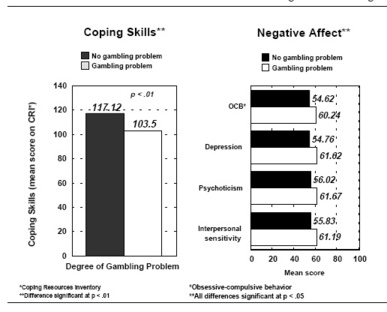The WAGER, Vol. 2(37) – Coping skills among formerly homeless pathological gamblers
Homeless individuals struggle with a variety of problems other than homelessness. For example, high rates of substance abuse and its medical, social and psychological complications, depression, and other mental health disorders are found among the homeless population*. A recent study** hypothesized that among a sample of formerly homeless substance-misusing veterans, those with gambling problems would have fewer coping skills and higher negative affect than those without a gambling problem. A sample of 154 formerly homeless substance-misusing veterans was assessed six months after discharge from the VA substance abuse treatment program. Respondents with a score of 5 or more on the SOGS were considered “problem gamblers.” Negative affect (e.g., depression, anger) was assessed using the SCL-90. Problem gamblers displayed significantly higher mean scores on four SCL-90 subscales than their non-problem gambling counterparts: (1) obsessive-compulsive behavior, (2) depression, (3) psychoticism (separation from reality), and (4) interpersonal sensitivity. In addition, the problem gamblers had significantly fewer coping skills as measured by the full scale of the Coping Resources Inventory. One implication of these findings is that formerly homeless substance-abusing individuals who also have a gambling problem may be at risk for becoming homeless again after completing a treatment program. Mental health struggles and decreased coping skills also may indicate high risk for relapse to addictive behaviors. Homeless individuals will benefit from being screened for gambling problems; in addition, all recovering people with multiple problems require more comprehensive and vigorous treatment.
Source: *Robertson, M.J., & Greenblatt (Eds.). (1992). Homelessness: A national perspective. New York: Plenum Press; **Castellani, B., Wootton, E., Rugle, L., Wedgeworth, R., Prabucki, K., & Olson, R. (1996). Homelessness, negative affect, and coping among veterans with gambling problems who misused substances. Psychiatric Services, 47(3), 298-299.
This public education project is funded, in part, by The Andrews Foundation.
